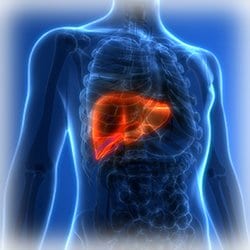13 Signs There's Something Wrong with Your Liver
 Your liver is an essential organ. It’s responsible for filtering your blood and ridding your body of toxins. It also makes substances your body needs and aids in the digestion of food. Those are just some of the hundreds of vital functions your liver performs every day.
Your liver is an essential organ. It’s responsible for filtering your blood and ridding your body of toxins. It also makes substances your body needs and aids in the digestion of food. Those are just some of the hundreds of vital functions your liver performs every day.
A healthy liver functions without a problem. But what happens if there is something wrong with your liver? Would you recognize the signs and know what to do?
Unfortunately, most issues with your liver don’t cause noticeable symptoms in their earliest stages. That means you may not know something is wrong right away. Here are answers to common questions about liver health—what conditions can damage your liver, what signs you should pay attention to, and how to keep your liver healthier.
What can go wrong with my liver?
- Viral Hepatitis is a virus that causes inflammation that may reduce liver function. There are different strains of the virus (hepatitis A, B and C).
- Cirrhosis causes scarring. As scar tissue replaces healthy liver tissue, it may cause the liver to no longer function properly.
- Fatty liver disease is becoming increasingly common in the U.S. as a result of rising rates of obesity. Excess fat in the liver may cause nonalcoholic fatty liver disease. Drinking too much alcohol can result in alcoholic fatty liver disease.
- Liver cancer may develop when abnormal cells multiply in your liver. It’s more common for cancer to spread to your liver from another area in your body than to develop initially in your liver, but it can happen.
- Liver failure can occur as a result of any liver condition that progresses over time. Although this can be life-threatening, there are treatments available that may slow progression of the condition. In some cases, a transplant may be necessary.
What are the signs of liver disease or damage?
Although you may have no symptoms of liver disease, especially in its earliest stages, the symptoms listed below should not be ignored. If you notice any of these signs, talk to your doctor:
- Jaundice (a yellowing of the skin and whites of the eyes)
- Pain or swelling in the abdomen
- Easy bruising
- Itchy skin
- Swelling in legs or ankles
- Losing weight without trying
- Loss of appetite
- Nausea and vomiting
- Weakness or constant fatigue
- White, chalky stools
- Low blood pressure
- Loss of balance or confusion
- Tremors (shaking)
Many of these symptoms can also be attributed to other conditions. To test liver function, a simple blood test is usually done. Other tests, such as an ultrasound, CT scan, MRI or biopsy, may also be ordered if liver damage, liver enlargement or cancer are suspected.
How can I keep my liver healthier?
There’s no guarantee that you can prevent liver disease, but these tips may lower your risk:
- Don’t drink excessive amounts of alcohol.
- Avoid illegal drugs and chemical exposure. Don’t smoke.
- Practice safe sex to avoid being infected with hepatitis. Also, don’t share needles, razors or other personal care items.
- Pay attention to warnings about medications, which can damage the liver. Be especially careful about mixing medications and alcohol. Avoid taking medications or vitamins above the recommended dosages.
- Maintain a healthy weight, eat a nutritious diet including vegetables and exercise regularly.
It’s important to talk to your primary care doctor about any changes in your health. To find a primary care doctor, visit PIHHealth.org/Find-a-Doctor today.
Copyright 2022 © Baldwin Publishing, Inc. All rights reserved. Health eCooking® is a registered trademark of Baldwin Publishing, Inc. Cook eKitchen™ is a designated trademark of Baldwin Publishing, Inc. Any duplication or distribution of the information contained herein without the express approval of Baldwin Publishing, Inc. is strictly prohibited.